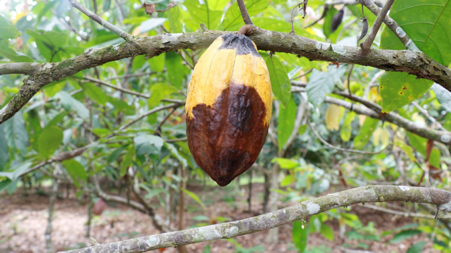The Ghana Cocoa Board (COCOBOD) has said it will spend US$250million on rehabilitating cocoa farms over the next three years.
The country is seeking to cut down and replant diseased and over-aged cocoa farms under a cocoa rehabilitation programme launched by President Nana Addo Dankwa Akufo-Addo last month. About 40 percent or 800,000 hectares, out of over 1.9 million hectares of cocoa farms, are either over-aged or affected by swollen-shoot virus disease, according COCOBOD.
Currently, Western, Southern and Eastern Cocoa regions are considered endemic areas, with most farms experiencing low yields due to being diseased. The programme, after three years, is expected to propel Ghana’s production to over 1million metric tonnes per annum.
Under the programme, when a farm is identified as diseased or over-aged, COCOBOD takes it over from the farmer, cuts down the trees, treats the land and replants before returning it to the farmer.
To ensure that the farmer does not lose his livelihood while the farm is being rehabilitated, temporary cash crops such as plantain, pawpaw and timber, among others, are grown on the farm to provide income for the farmer, as well as shelter for the young cocoa trees.
Additionally, farmers, landlords and traditional leaders are compensated when farms are rehabilitated. For instance, for a hectare of cocoa farm government pays the farmer GH¢1000, with the landowner and chief also receiving the same amount.
John Ahi, District Technical Officer at COCOBOD, Boako district of the Western North Region said: “It is so because some of the farmers have only one hectare which they depend on for their livelihood. Also, due to the land tenure system, they were initially afraid that if their farms are cut down the landowner would it take away from them; but when government brought in compensation for both the farmer and landowner, they are now allowing us to treat the farms”.
For his district, he said, the target for this year is 1,668 hectares of cocoa farms; of which 62.1 hectares have been treated so far.
Impact on production
Production has been declining in recent times due to the swollen-shoot disease and over-aged trees. In 2018/2019, the country produced an estimated 812,0000 tonnes of cocoa beans – a decrease from approximately 969,000 tonnes in 2016/2017. The rehabilitation exercise could therefore further lower output over the next three years, given that cocoa takes an average of three years to start fruiting.
This notwithstanding, some experts remain upbeat that the current figure of about 700,000 metric tonnes can be sustained regardless of the programme – which is expected to affect 40 percent of farms.
“Cote d’Ivoire is around 2million metric tonnes while we are below 1million metric tonnes, but we have a common land size in terms of production,” said Samuel Asare Ankamah, Regional Manager, Cocoa Health and Extension Division (CHED) – COCOBOD, Western South Cocoa Region.
For him, the way forward to sustain output is hand pollination; a method he says has the potential to increase yield per tree from 25 to over 150 pods per tree.
Although tedious, if done effectively along with good agronomic practices like fertiliser application and spraying, he said cocoa production could remain intact despite the potential of having to lose 40 percent of cocoa trees to the rehabilitation programme.
CHED collaboration with Solidaridad
CHED and Solidaridad, an international civil society organisation, are currently implementing the second phase of the Cocoa Rehabilitation and Intensification Progamme (CORIP II), an Embassy of the Kingdom of the Netherlands in Accra-funded project.
CORIP II uses public funds to leverage private sector investments from commercial banks and impact investors for cocoa rehabilitation and intensification. The programme, among other things, seeks to increase access to finance for cocoa farmers, promote youth and women participation, as well as promote resilience through climate-smart cocoa production.
“We have hired the services of a service provider, but before the service provider comes in we have a weeding gang that goes in to clear the farm before the service provider gets access to cut the trees before the CHED comes in to do the land preparation and replanting. All these involve money, so we are very much happy to have Solidaridad supporting us,” said Isaac Adu, Deputy Manager, CHED-COCOBOD, Western North.
Under CORIP II, about 70,000 farmers are to be trained in climate-smart cocoa production through the use of model farms.
Meanwhile, as part of the collaboration, Solidaridad is supporting CHED with the necessary training material. So far, Wellington boots, cutlasses, bundles of tissue-paper, gallons of hand sanitiser, among others, have been presented to CHED offices in Western North, Central and Ahafo Regions for onward distribution to farmers.










